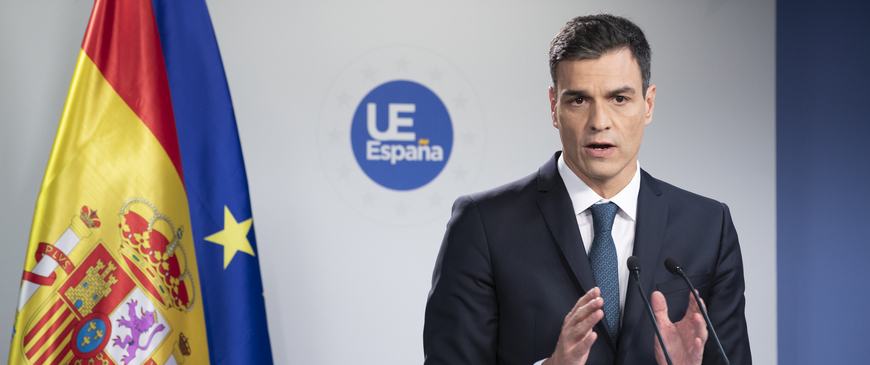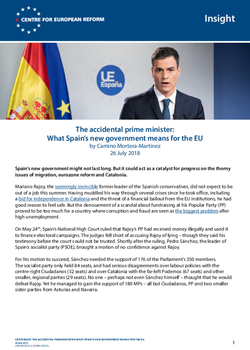
The accidental prime minister: What Spain's new government means for the EU
Spain’s new government might not last long. But it could act as a catalyst for progress on the thorny issues of migration, eurozone reform and Catalonia.
Mariano Rajoy, the seemingly invincible former leader of the Spanish conservatives, did not expect to be out of a job this summer. Having muddled his way through several crises since he took office, including a bid for independence in Catalonia and the threat of a financial bailout from the EU institutions, he had good reason to feel safe. But the denouement of a scandal about fundraising at his Popular Party (PP) proved to be too much for a country where corruption and fraud are seen as the biggest problem after high unemployment.
On May 24th, Spain’s National High Court ruled that Rajoy’s PP had received money illegally and used it to finance electoral campaigns. The judges fell short of accusing Rajoy of lying – though they said his testimony before the court could not be trusted. Shortly after the ruling, Pedro Sánchez, the leader of Spain’s socialist party (PSOE), brought a motion of no confidence against Rajoy.
No one – perhaps not even Sánchez himself – thought that he would defeat Rajoy.
For his motion to succeed, Sánchez needed the support of 176 of the Parliament’s 350 members. The socialist party only held 84 seats, and had serious disagreements over labour policies with the centre-right Ciudadanos (32 seats) and over Catalonia with the far-left Podemos (67 seats) and other smaller, regional parties (29 seats). No one – perhaps not even Sánchez himself – thought that he would defeat Rajoy. Yet he managed to gain the support of 180 MPs – all but Ciudadanos, PP and two smaller sister parties from Asturias and Navarra.

Initially, there was little expectation that Sánchez would be able to govern in a fragmented parliament: Rajoy had struggled to pass laws with his bloc of 137 seats, and only managed to get the annual budget through after promising the Basque Nationalist Party €540 million in investments for the region. And public opinion was not on Sánchez’s side: while Spaniards are certainly tired of the inability of their politicians to crack down on corruption, they are also unsure if Sánchez is the right man for the job. A survey published in April by the Spanish National Centre for Social Research (CIS), a publicly funded research institute, found that eight out of ten Spaniards said they had "little or no trust" in Sánchez. This makes sense: the PSOE itself has also been involved in a number of corruption cases in recent years.
Some compare Sánchez to French President Emmanuel Macron. Both are young, charismatic and fiercely pro-European. Like Macron, Sánchez has managed to pull together a cabinet of highly capable and internationally-minded ministers (his appointments have helped him gather popular support for his project, at the expense of Ciudadanos). But, unlike his French counterpart, Sánchez needs to manage both a hung parliament and a very divided party. Spain also has less clout in Europe than its neighbour: Macron has given a new impetus to the traditional Franco-German axis, which is again steering the EU through some of its most pressing challenges, from eurozone reform to migration. Meanwhile, the financial crisis and Rajoy’s low profile in Europe have reduced Madrid’s diplomatic weight in Brussels.
Sánchez’s ability to reform Spain and the EU is limited. But he is already breaking away from Rajoy’s wait-and-see approach on eurozone reform, migration and Catalonia.
Sánchez’s ability to reform Spain and the EU is limited. Despite his desire to remain in office until the end of the parliamentary term in 2020, he may be forced to call elections sooner rather than later. The parties supporting his minority government have very different views on issues including Catalonia, social and labour policies and the budget. A big disagreement on any of these subjects could crack this fragile coalition. But Sánchez’s accidental government seems determined to make the most of its limited time. Spain’s new prime minister is already breaking away from Rajoy’s wait-and-see approach on three questions of strategic importance for both Brussels and Madrid: eurozone reform, migration and Catalonia.
Rajoy prided himself on having managed to avoid a bail-out for Spain during the darker moments of the eurozone crisis. In exchange, his government agreed to implement painful reforms which kept Germany and others happy. When Spain’s economic situation began to improve (despite stubbornly high rates of youth unemployment), the country became the poster child for Angela Merkel’s macroeconomic policies for the eurozone. Rajoy’s government did not want to upset the German chancellor by supporting Macron’s ambitious plans for better risk and burden-sharing mechanisms and improved governance in the eurozone, no matter how much these plans would work in Spain’s favour. In a policy paper published in April, the government did not mention either the ‘eurobonds’ (the mutualisation of debt) or the creation of a eurozone finance minister, two of Macron’s initial ideas, which were later rejected by Germany. Perhaps most surprisingly, in its April paper the Spanish government did not even push for the establishment of a eurozone budget, a measure subsequently supported by Merkel. In trying to please everybody, Rajoy ended up being more Catholic than the Pope.
While Sánchez has yet to lay out his government’s views on eurozone reform publicly, his choice of ministers suggests he will challenge Rajoy’s position, by focusing on growth-oriented structural reforms. In May, Spain’s new foreign affairs minister, Josep Borrell, together with several other prominent politicians and economists, signed a letter demanding urgent changes in the eurozone – including the creation of a common budget and a eurozone finance minister. And Nadia Calviño, whom Sánchez appointed as Minister of the Economy, is a former director general for budget at the European Commission, where thinking on eurozone reform is closer to Macron than to Merkel.
Spain’s change of tune has been more evident on migration: since taking office, Sánchez has taken several decisions designed to distance him from Rajoy’s cautious approach to the EU’s migration woes. First, he offered a safe haven to the ‘Aquarius’, a migrant rescue ship operated by the NGO Doctors Without Borders. The ship had rescued 629 migrants from the Central Mediterranean, but the hard-line Italian Interior Minister Matteo Salvini had refused to allow it to put them ashore in Italy. Spain has subsequently opened its ports to other migrant rescue ships. The 629 migrants from the ‘Aquarius’ landed in Valencia on June 17th. Most of them remain in Spain, awaiting a decision on their asylum applications. Less than a month later, Sánchez announced that Spain was willing to take in 50 of the 450 migrants rescued by the Italian coast guard and Frontex, the EU’s border agency, on July 14th 2018.
Spain’s new efforts to make Europe’s migration policies work are commendable. But there is a lot more Madrid should do to be part of the solution to the EU's migration problem.
Spain’s new efforts to make Europe’s migration policies work are commendable. But there is a lot more Madrid should be doing if it wants to be part of the solution to the migration problem. On July 12th, the Spanish Supreme Court ruled that Spain was breaching EU law, because it had taken in only 12 per cent of the 19,449 asylum seekers Madrid agreed to receive under a 2015 emergency quota system. (The scheme mandated EU member-states to accept a number of asylum seekers from Italy and Greece.) The UN refugee agency has said that Spain lacks the necessary infrastructure to house and integrate the number of asylum seekers and economic migrants reaching its shores. This raises questions about the sustainability of the new government’s ‘open-arms’ approach to boats stranded in the Central Mediterranean. Despite Sánchez’s calls for a fair and effective European asylum system, during the last European Council on June 28th-29th, Spain made it clear that it is not willing to host ‘controlled centres’ – an Italian proposal to distribute asylum seekers among EU member-states that are willing to process their applications. Sánchez has now the chance to use Spain’s leverage on migration (Madrid is often praised for having halted a migration crisis in 2006) to put forward sustainable proposals combining border controls with a fairer redistribution of asylum seekers and refugees.
Perhaps Sánchez’s boldest turnaround to date has been on the Catalonian question. After years of political inaction based on Rajoy’s belief that, if he ignored it long enough, the problem would disappear, Spain suffered its biggest constitutional crisis since Franco’s death. The former Catalonian president, Carles Puigdemont, unilaterally declared Catalonia’s independence in October 2017 and then fled the country. Ever since, he has been at the centre of a legal-political battle between Spain, Belgium and Germany, which have refused to extradite Puigdemont for allegedly having used violence during the lead-up to the declaration of independence. (Several of Puigdemont’s colleagues are already in jail in Spain on the same charges). The new Catalan president, Quim Torra, who is even more radical than Puigdemont himself, took office in May and immediately launched a campaign against the government in Madrid, which he accused of taking political prisoners. Rajoy’s passivity only strengthened his case.
Sánchez has learned from his predecessor’s mistakes. He knows that turning a blind eye to Catalonia’s societal problem only fuels nationalism and increases confrontation. That is why one of Sánchez’s first decisions as prime minister was to meet Torra to seek a way out of the current stalemate. This first meeting did not produce any major breakthroughs. But the symbolic decision to revive a bilateral Madrid-Barcelona working group, inactive since 2011, and Sánchez’s announcement that Catalan politicians serving their sentences outside Catalonia would be allowed to move closer to home, have gone a long way to ease tensions. Sánchez must tread carefully: the balancing act between re-opening dialogue with Barcelona and ensuring that every Spanish citizen complies with the law, no matter what their political affiliations may be, is not easy.
Sánchez may have taken many by surprise, and he may not have the time or the parliamentary support to do much. But his is a government keen on earning its pro-European stripes in the time it has. Spain should use this window of opportunity to find its voice in Europe again. The rest of the EU stands to benefit if it can hear more from one of its ‘Big Six’ (soon to be five, after Brexit). Populism, the future of Schengen and the eurozone are important for all member-states – not only France and Germany.
Camino Mortera-Martinez is a senior research fellow at the Centre for European Reform.


Add new comment